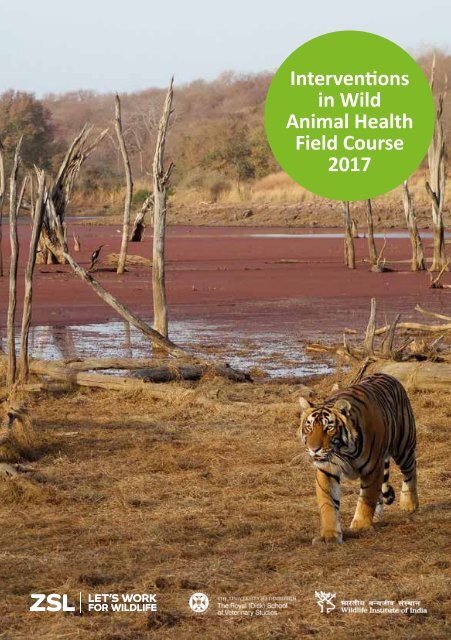Interventions in Wild Animal Health
A short brochure detailing all the key information about our Interventions in Wild Animal Health Field Course. A course designed to provide practical skills to complement students pre-existing theoretical knowledge gained from the MSc in Conservation Medicine.
A short brochure detailing all the key information about our Interventions in Wild Animal Health Field Course. A course designed to provide practical skills to complement students pre-existing theoretical knowledge gained from the MSc in Conservation Medicine.
Create successful ePaper yourself
Turn your PDF publications into a flip-book with our unique Google optimized e-Paper software.
<strong>Interventions</strong><br />
<strong>in</strong> <strong>Wild</strong><br />
<strong>Animal</strong> <strong>Health</strong><br />
Field Course<br />
2017
Field Course Background<br />
The Zoological Society of London (ZSL), The<br />
<strong>Wild</strong>life Institute of India (WII) and The<br />
University of Ed<strong>in</strong>burgh have been motivated<br />
to run this course <strong>in</strong> recognition of the need<br />
to conserve globally important biodiversity<br />
<strong>in</strong> South Asia and other biodiverse areas,<br />
which are nevertheless a hotspot for wildlife<br />
diseases and conflict. These wildlife diseases<br />
are relatively unstudied and unchecked and<br />
there is an important need for greater expertise<br />
<strong>in</strong>, and greater numbers of, wildlife health<br />
professionals to tackle them. Such wildlife<br />
health professionals are needed to undertake<br />
<strong>in</strong>terventions <strong>in</strong> the health, welfare and<br />
conservation of wild animals, to <strong>in</strong>vestigate<br />
emerg<strong>in</strong>g <strong>in</strong>fectious diseases and to ensure<br />
human well-be<strong>in</strong>g.<br />
Therefore, ZSL, WII and the University of<br />
Ed<strong>in</strong>burgh, with the support of the Thriplow<br />
Trust, have developed a field course to provide<br />
tra<strong>in</strong><strong>in</strong>g for <strong>in</strong>terventions <strong>in</strong> wildlife health<br />
as an <strong>in</strong>tegral component of the MVetSci<br />
Conservation Medic<strong>in</strong>e. The course provides<br />
veter<strong>in</strong>arians, particularly from South Asia,<br />
with an important practical element when they<br />
enrol for the onl<strong>in</strong>e programme.<br />
The <strong>Interventions</strong> <strong>in</strong> <strong>Wild</strong> <strong>Animal</strong> <strong>Health</strong> Course<br />
provides practical knowledge to complement<br />
the theoretical understand<strong>in</strong>g ga<strong>in</strong>ed from<br />
other courses of the onl<strong>in</strong>e Conservation<br />
Medic<strong>in</strong>e Cert/Dip/MVetSci programme.<br />
<strong>Interventions</strong> are required to address humanwildlife<br />
conflict issues, to carry out effective<br />
metapopulation management through<br />
translocation, to reduce the risk from disease <strong>in</strong><br />
re<strong>in</strong>troduction and translocation programmes,<br />
to carry out <strong>in</strong>vestigations <strong>in</strong> disease outbreaks<br />
<strong>in</strong> free-liv<strong>in</strong>g wildlife and to understand the role<br />
of disease <strong>in</strong> the decl<strong>in</strong>e of species.<br />
Eligibility<br />
In order to be eligible for the course runn<strong>in</strong>g<br />
<strong>in</strong> 2018, a candidate will need to have enrolled<br />
<strong>in</strong> the Conservation Medic<strong>in</strong>e Programme at<br />
the University of Ed<strong>in</strong>burgh by the application<br />
deadl<strong>in</strong>e of 22nd August 2016. Priority for<br />
the <strong>Interventions</strong> Course <strong>in</strong> <strong>Wild</strong> <strong>Animal</strong><br />
<strong>Health</strong> will be given to South Asian students. A<br />
limited number of places may also be available<br />
for veter<strong>in</strong>arians from South Asia who are<br />
not enrolled <strong>in</strong> the Conservation Medic<strong>in</strong>e<br />
programme.<br />
What will I do?<br />
Tuition will be carried out <strong>in</strong> the field to develop skills <strong>in</strong> humanwildlife<br />
conflict management, disease risk analysis and translocation<br />
techniques, disease outbreak <strong>in</strong>vestigation and monitor<strong>in</strong>g of<br />
the health of decl<strong>in</strong><strong>in</strong>g species. It will <strong>in</strong>clude techniques for field<br />
monitor<strong>in</strong>g of wildlife (us<strong>in</strong>g a range of techniques <strong>in</strong>clud<strong>in</strong>g animal<br />
tracks and signs, dung/pellet identification and quantification,<br />
census techniques, camera trapp<strong>in</strong>g, and radio telemetry), biological<br />
management, visual health monitor<strong>in</strong>g of free-liv<strong>in</strong>g animals, best<br />
practice <strong>in</strong> wild animal anaesthesia techniques, demonstration<br />
and hands-on practice, cl<strong>in</strong>ical exam<strong>in</strong>ation <strong>in</strong> the field, sampl<strong>in</strong>g<br />
techniques for <strong>in</strong>fectious disease screen<strong>in</strong>g, pathological exam<strong>in</strong>ation<br />
<strong>in</strong> the field, and scann<strong>in</strong>g disease surveillance scenarios.<br />
Learn<strong>in</strong>g Outcomes<br />
1. To ga<strong>in</strong> a critical awareness of the effects of <strong>in</strong>terventions<br />
at the human-wildlife <strong>in</strong>terface.<br />
2. To develop a systematic understand<strong>in</strong>g of the plann<strong>in</strong>g<br />
of, and field methods <strong>in</strong>, wildlife monitor<strong>in</strong>g, biological<br />
management, and disease outbreak <strong>in</strong>vestigation<br />
3. To ga<strong>in</strong> a comprehensive understand<strong>in</strong>g <strong>in</strong>clud<strong>in</strong>g new<br />
<strong>in</strong>sights <strong>in</strong>to disease risk management <strong>in</strong> translocation<br />
programmes<br />
4. To ga<strong>in</strong> a critical awareness of field methods to <strong>in</strong>vestigate<br />
the role of disease <strong>in</strong> the decl<strong>in</strong>e of species<br />
5. A comprehensive understand<strong>in</strong>g of ex-situ medic<strong>in</strong>e and<br />
management <strong>in</strong> the context of field <strong>in</strong>terventions
Where, When, Who?<br />
Field Site<br />
The course will be run at Sariska Tiger Reserve<br />
<strong>in</strong> the state of Rajasthan, about 200km from<br />
New Delhi. Cover<strong>in</strong>g 866km2 the reserve<br />
supports a plethora of Indian wildlife species<br />
and provides opportunities for the <strong>in</strong>-field<br />
teach<strong>in</strong>g of all subjects covered on the course.<br />
When is the course run?<br />
The course runs dur<strong>in</strong>g the month of February<br />
for approximately 2.5 weeks. This <strong>in</strong>cludes all<br />
your teach<strong>in</strong>g, field visits, travell<strong>in</strong>g <strong>in</strong> country<br />
and opportunities to experience Indian culture.<br />
Tutors<br />
You will be taught by experienced wildlife<br />
veter<strong>in</strong>arians and ecologists from The WII,<br />
ZSL and The University of Ed<strong>in</strong>burgh. Guest<br />
lecturers from relevant <strong>in</strong>stitutes and national<br />
parks with<strong>in</strong> India will also contribute to your<br />
learn<strong>in</strong>g experience. All the course lecturers<br />
have recognised research and field experience<br />
<strong>in</strong> their subjects.<br />
Costs<br />
The course fee will cover your accommodation<br />
and food for the course duration, travel with<strong>in</strong><br />
India and Park fees.<br />
Flights to India, <strong>in</strong>surance and visa fees are not<br />
<strong>in</strong>cluded.<br />
How to apply<br />
If you are eligible for the course and<br />
wish to apply please contact<br />
conservation.medic<strong>in</strong>e@ed.ac.uk.<br />
Alternatively, if you have any questions<br />
regard<strong>in</strong>g the course please contact<br />
wildlifehealthbridge@ioz.ac.uk


